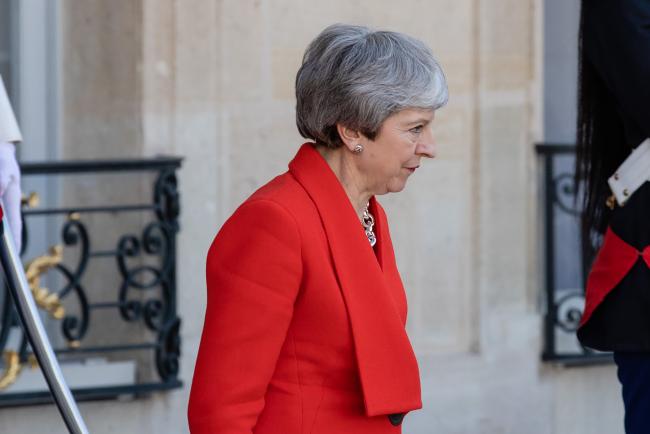(Bloomberg) -- Theresa May is confronting the end of her premiership after her own party forced her to agree to set a timeline to quit as U.K. prime minister.
Before announcing the schedule for her departure, May will try one last time to finish the job she started and get her Brexit deal approved in a vote in Parliament at the beginning of June.
She is unlikely to succeed. Officials in the opposition Labour Party -- whose votes she needs -- suggested May’s decision makes it even less likely that they will agree to a compromise to get her divorce deal over the line.
As soon as that vote is over, the prime minister will be forced to agree to a timetable for leaving office, under the terms of a deal she struck with her own Conservative Party on Thursday.
No Refreshments or Snacks
“We had a very frank exchange with the prime minister,” Graham Brady, the Conservative Party’s most senior rank-and-file politician, told reporters after he and other senior Conservatives on the executive panel of the party’s 1922 Committee met May for a showdown behind closed doors.
One person in the room said that May was accompanied by Chief Whip Julian Smith, Party Chairman Brandon Lewis, and a parliamentary aide, Andrew Bowie. Her chief of staff, Gavin Barwell, was in an ante-room. There were no refreshments or snacks, the attendee said.
They described the tone of the meeting as polite, but underneath that were stern people giving a serious message to the premier, who at one point was visibly upset. An ally of May pushed back against that characterization, saying she’d been frustrated.
The pound weakened. Investors are bracing for more political turmoil and a leadership race that could put a hardline Brexit-backer in office. The contest is likely to take months, putting the divorce process once again on hold, and who wins will redefine what Brexit will actually mean.
Boris Declares
Contenders to replace May have already begun campaigning. On Thursday, former Foreign Secretary Boris Johnson, who has been arguing for a harder split from the bloc than May’s deal allows, became the latest and highest profile name to declare he will run.
That’s unlikely to be welcomed by the Labour Party, which has been in talks with May for more than six weeks to find a common way forward that both parties could support.
Even before Brady’s announcement, there were signs the process was running out of steam. The party’s business spokeswoman, Rebecca Long-Bailey, told BBC radio Thursday that any promises May made needed to be "entrenched" so any future Tory leader couldn’t reverse them.
After May’s meeting with Brady, Labour officials were even gloomier, with one saying it hadn’t helped the talks and another saying there’s now little chance of a deal because there will be a new government with a different view very soon.
Out of Patience
“Every one of the likely candidates is promising to tear up any compromise agreement she might negotiate with Labour,” the party’s trade spokesman, Barry Gardiner, told Bloomberg. “That is hardly the spirit of constructive dialogue that we were promised.”
May has clung fiercely to power despite suffering repeated set-backs to her political project, including an election gamble that went wrong, and three humiliating Parliamentary defeats for the divorce agreement she spent two years negotiating with the European Union.
Now her own party has finally run out of patience as polls suggest the Conservatives are heading for a historic drubbing in the European elections next week. The U.K. wasn’t meant to take part in those elections, and is only doing so because Brexit has been delayed.
On Thursday, May met first with the executive of the 1922 Committee and then had a separate meeting just with Brady, at which their joint statement was agreed, according to two people familiar with the proceedings. Brady then went off to make sure the rest of the panel agreed with the statement.
After their private meeting, Brady said he and May agreed that they will meet again to finalize the timetable for electing a new Conservative leader after the Withdrawal Agreement Bill is put to a vote in the House of Commons in the first week of June. That meeting will happen “regardless” of whether the Brexit deal law is approved or rejected, he said.
The result is that the U.K. is now likely to have a new prime minister before it is due to leave the EU at the end of October. Unless May can work a political miracle or she decides to radically reverse her own position, it is likely to be left to the next leader to take Britain out of the EU.
(Adds details from meeting starting in fifth paragraph.)
